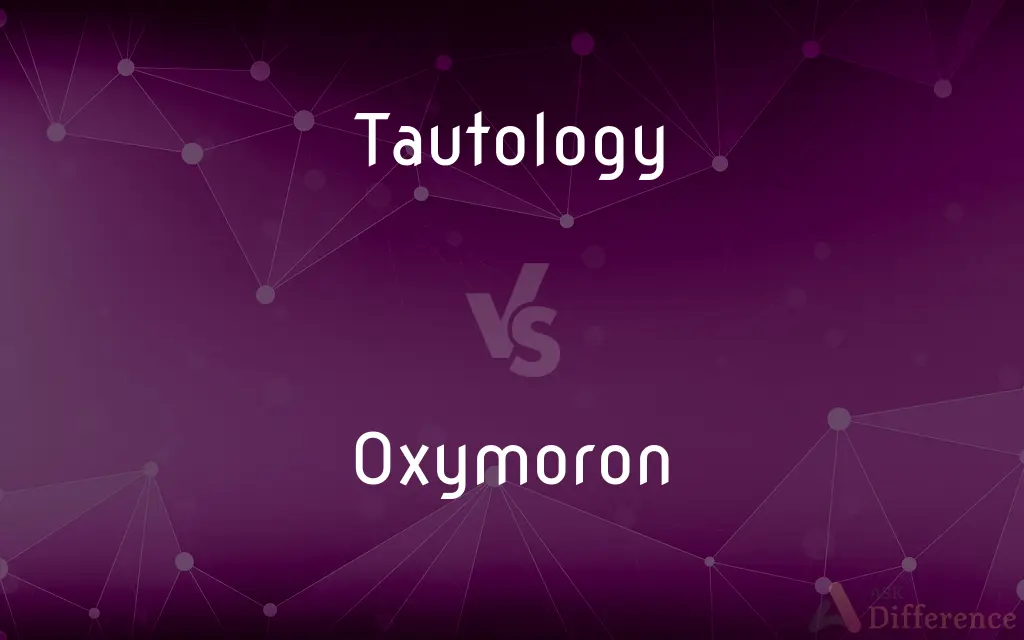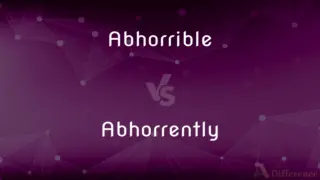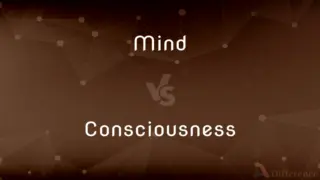Tautology vs. Oxymoron — What's the Difference?
Edited by Tayyaba Rehman — By Fiza Rafique — Updated on March 31, 2024
Tautology involves redundant or repetitive statements that don't add new information, while an oxymoron combines contradictory terms for effect.

Difference Between Tautology and Oxymoron
Table of Contents
ADVERTISEMENT
Key Differences
Tautology is the use of different words to say the same thing twice in a sentence, often seen as unnecessary repetition. Whereas, an oxymoron is a figure of speech that combines two seemingly contradictory terms, creating a paradoxical effect.
Tautologies are often used unintentionally in everyday language or for emphasis in rhetorical contexts, making statements feel more comprehensive. On the other hand, oxymorons are deliberately used in literature and speech to create a dramatic, humorous, or thought-provoking effect by juxtaposing opposites.
In logic and mathematics, tautology refers to a statement that is true in every possible interpretation, underscoring its redundancy. Meanwhile, an oxymoron in these fields is less common but can be found in discussions where contrasting ideas are explored to highlight complexities or nuances.
Tautology can lead to clarity or redundancy, depending on its use, emphasizing a point through repetition. Conversely, an oxymoron relies on the tension between the combined terms to evoke curiosity, reflection, or a new perspective.
While tautology may sometimes be criticized for being overly verbose or unnecessary, it plays a role in ensuring understanding or adding rhetorical weight. Oxymoron, by contrast, is celebrated for its cleverness and ability to succinctly convey complex or nuanced ideas through contradiction.
ADVERTISEMENT
Comparison Chart
Definition
Redundant or repetitive statement in different words
Combination of contradictory terms
Purpose
To emphasize or clarify
To create a dramatic or thought-provoking effect
Usage
Everyday language, rhetoric
Literature, speeches
Effect
Can be unnecessary or emphasize a point
Evokes curiosity, reflection, or humor
Examples in Literature
"free gift", "advance warning"
"bitter sweet", "deafening silence"
Compare with Definitions
Tautology
Repetitive use of phrases with similar meanings.
The meeting was canceled due to lack of attendance.
Oxymoron
Combines contradictory terms for effect.
The comedian was seriously funny.
Tautology
Used for emphasis in rhetoric.
They saw it with their own eyes.
Oxymoron
Used to create paradoxical or intriguing statements.
The silence was deafening in the room.
Tautology
Often seen as a linguistic error or stylistic fault.
It's a free gift for everyone who participates.
Oxymoron
Found in literature and speeches for emphasis.
She's a cruelly kind person.
Tautology
Common in everyday speech for clarity.
The Sahara Desert is very dry.
Oxymoron
Can highlight complexities or contradictions.
It was an open secret among us.
Tautology
Can be a logical statement that is always true.
Either it will rain tomorrow, or it will not rain tomorrow.
Oxymoron
Encourages reflective or humorous interpretations.
That actor is clearly confused about his role.
Tautology
The saying of the same thing twice over in different words, generally considered to be a fault of style (e.g. they arrived one after the other in succession).
Oxymoron
An oxymoron (usual plural oxymorons, more rarely oxymora) is a figure of speech that juxtaposes concepts with opposing meanings within a word or phrase that creates an ostensible self-contradiction. An oxymoron can be used as a rhetorical device to illustrate a rhetorical point or to reveal a paradox.
Tautology
Needless repetition of the same sense in different words; redundancy.
Oxymoron
A rhetorical figure in which incongruous or contradictory terms are combined, as in a deafening silence and a mournful optimist.
Tautology
An instance of such repetition.
Oxymoron
(rhetoric) A figure of speech in which two words or phrases with opposing meanings are used together intentionally for effect.
Tautology
(Logic) A statement composed of simpler statements in such a way that it is logically true whether the simpler statements are factually true or false; for example, the statement Either it will rain tomorrow or it will not rain tomorrow.
Oxymoron
A contradiction in terms.
Tautology
(uncountable) Redundant use of words, a pleonasm, an unnecessary and tedious repetition.
It is tautology to say, "Forward Planning".
Oxymoron
A figure in which an epithet of a contrary signification is added to a word; e. g., cruel kindness; laborious idleness.
Tautology
(countable) An expression that features tautology.
The expression "raze to the ground" is a tautology, since the word "raze" includes the notion "to the ground".
Oxymoron
Conjoining contradictory terms (as in `deafening silence')
Tautology
A statement that is true for all truth values of its propositional variables.
Tautology
A statement that is true for all truth values of its Boolean atoms.
Tautology
A repetition of the same meaning in different words; needless repetition of an idea in different words or phrases; a representation of anything as the cause, condition, or consequence of itself, as in the following lines: -The dawn is overcast, the morning lowers,And heavily in clouds brings on the day. Addison.
Tautology
(logic) a statement that is necessarily true;
The statement `he is brave or he is not brave' is a tautology
Tautology
Useless repetition;
To say that something is `adequate enough' is a tautology
Common Curiosities
Why do writers use oxymorons?
Oxymorons are used to create dramatic, humorous, or thought-provoking effects by juxtaposing contradictory terms.
What is an oxymoron?
An oxymoron is a figure of speech that combines two contradictory terms for a specific effect.
Why do writers use tautologies?
Writers use tautologies for emphasis, clarity, or rhetorical effect.
Can a statement be both a tautology and an oxymoron?
Typically, no, as tautology involves redundancy, while oxymoron involves contradiction.
Is "pretty ugly" an oxymoron?
Yes, "pretty ugly" is an oxymoron as it combines terms that are opposite in meaning.
Are tautologies always unnecessary?
Not always; they can serve to emphasize or clarify a point.
Can an oxymoron make sense?
Yes, oxymorons can make sense by highlighting the complexity or nuance of a situation.
Is "jumbo shrimp" an oxymoron?
Yes, "jumbo shrimp" is an oxymoron because it combines opposing size descriptors.
What is the effect of an oxymoron in poetry?
In poetry, an oxymoron can evoke deep thought, surprise, or emotional complexity.
What is tautology?
Tautology is the redundant repetition of the same idea in different words within a sentence.
What is the difference between a tautology and pleonasm?
Tautology is redundancy in ideas, while pleonasm is redundancy in words, often including tautologies.
Is "exact estimate" a tautology?
No, "exact estimate" is more of an oxymoron as it combines contradictory concepts.
How can tautology be avoided in writing?
By eliminating redundant phrases or words that don't add new information.
Can tautologies be useful in logic?
Yes, in logic, tautologies are statements that are always true, useful for establishing foundational truths.
Do tautologies strengthen arguments?
They can, by making statements unequivocal, but may also weaken them if seen as overly verbose.
Share Your Discovery

Previous Comparison
Abhorrible vs. Abhorrently
Next Comparison
Mind vs. ConsciousnessAuthor Spotlight
Written by
Fiza RafiqueFiza Rafique is a skilled content writer at AskDifference.com, where she meticulously refines and enhances written pieces. Drawing from her vast editorial expertise, Fiza ensures clarity, accuracy, and precision in every article. Passionate about language, she continually seeks to elevate the quality of content for readers worldwide.
Edited by
Tayyaba RehmanTayyaba Rehman is a distinguished writer, currently serving as a primary contributor to askdifference.com. As a researcher in semantics and etymology, Tayyaba's passion for the complexity of languages and their distinctions has found a perfect home on the platform. Tayyaba delves into the intricacies of language, distinguishing between commonly confused words and phrases, thereby providing clarity for readers worldwide.














































